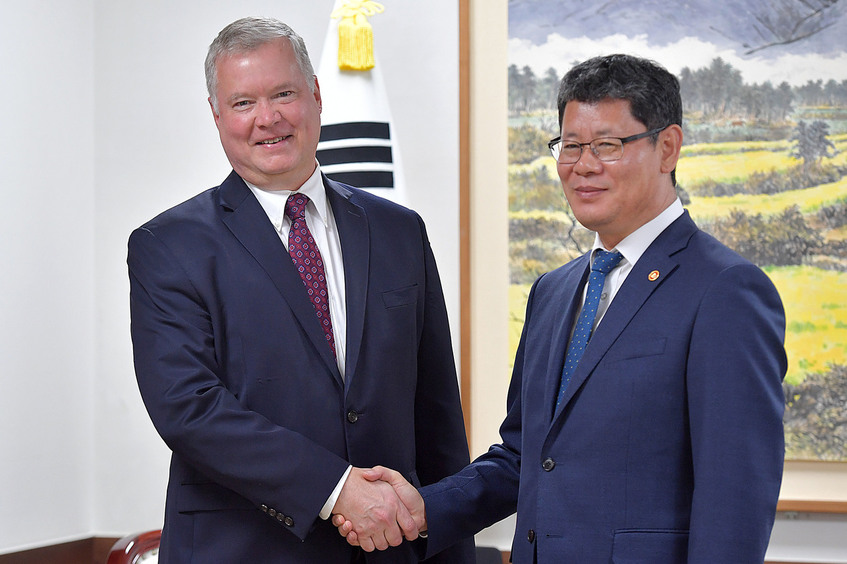 |
|
US State Department Special Representative for North Korea Stephen Biegun and South Korean Special Representative for Korean Peninsula Peace and Security Affairs Lee Do-hoon talk to reporters after their meeting at the South Korean Ministry of Foreign Affairs in Seoul on Aug. 21. (airs in Seoul on Aug. 21.
|
US representative in denuclearization negotiations meets with S. Korean officials in Seoul
Stephen Biegun, the US State Department special representative for North Korea, dismissed speculation that the US representative for negotiations would be replaced. “I will remain focused on making progress on North Korea,” Biegun said on Aug. 21 during a visit to South Korea. “We are prepared to engage [in negotiations] as soon as we hear from our counterparts in North Korea,” he added. With Biegun effectively sending a message to Pyongyang calling for the resumption of working-level talks, the next questions is how North Korea will respond. Biegun met that day with South Korean Ministry of Foreign Affairs Special Representative for Korean Peninsula Peace and Security Affairs Lee Do-hoon at the South Korean Ministry of Foreign Affairs (MOFA) in Seoul’s Jongno neighborhood, where the two spent over an hour discussing matters including the swift resumption of North Korea-US working-level talks. Speaking to reporters afterwards, Biegun said, “I will not be taking up a diplomatic posting in the Russian Federation, and I will remain focused on making progress on North Korea.” Stressing that the resumption of bilateral working-level talks was based on an agreement between North Korean leader Kim Jong-un and US President Donald Trump, he added, “I am fully committed to this important mission, and we will get this done.” His message reaffirmed his plans to devote himself to resolving the North Korean nuclear issue while directly rebutting recent speculation from CNN and other news outlets that he might be tapped as US ambassador to Russia. “President Trump gave me and my team the assignment to restart working-level negotiations with North Korea, as agreed by Chairman Kim, to successfully implement the four commitments the two leaders made in Singapore [shortly after the two leaders’ historic meeting in Panmunjom on June 30],” he said. It remains unclear whether North Korea will actually agree to working-level communications during Biegun’s South Korea visit. Many are speculating that Pyongyang could participate in talks after the completion of policy and personnel changes by the Supreme People’s Assembly. “There’s a good chance North Korea will agree to working-level talks after the second meeting of its 14th Supreme People’s Assembly on Aug. 29,” predicted a South Korean government official who is closely acquainted with North Korea-US dialogue. Another government official said, “It may not be this time around, but it looks as though there will be a signal shortly [from North Korea].” No specific date or venue set for working-level talks While Pyongyang and Washington have reportedly been engaged in behind-the-scenes communication through their New York and other diplomatic channels – as evidenced by Trump’s July 22 announcement that he had exchanged correspondence with North Korea – no specific date or venue appears to have been decided for working-level talks.
 |
|
South Korean Unification Minister Kim Yeon-chul shakes hands with US State Department Special Representative for North Korea Stephen Biegun at the Central Government Complex in Seoul on Aug 21.
|







